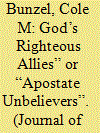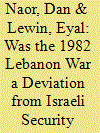|
|
|
Sort Order |
|
|
|
Items / Page
|
|
|
|
|
|
|
| Srl | Item |
| 1 |
ID:
191898


|
|
|
|
|
| Summary/Abstract |
In mid-2000, the publication of the anti-Taliban book Kashf Shubuhāt al-Muqātilīn caused a stir in jihādī circles. Written by Arab jihādīs based in Peshawar, Pakistan, the book made the case that it was not permissible for Muslims to fight alongside the Afghan Taliban on the grounds that the group was not sufficiently Islamic, having committed a host of polytheist acts. While some of the jihādī movement’s leading scholarly authorities quickly refuted the book, its anti-Taliban arguments nonetheless gained popularity over time. Today, the jihādī movement is divided between those who see the Taliban as a legitimate Islamic movement worthy of praise and support (the view espoused by al-Qaida and its supporters) and those who perceive it as an apostate movement standing in the way of true Islamic revival (the view adopted by the Islamic State and its supporters). The controversy over Kashf Shubuhāt al-Muqātilīn in 2000 prefigures the current divide and provides something of the context in which it should be understood.
|
|
|
|
|
|
|
|
|
|
|
|
|
|
|
|
| 2 |
ID:
191895


|
|
|
|
|
| Summary/Abstract |
This research explores the development of the Palestinian Islamic Jihad (PIJ) over the last decade as a proxy organization of the Iranian regime, or as a group that finds its way between Palestinian nationalism and support for the religious Islamic revolution of Iran. Most studies of Islamic organizations in Palestine focus on Hamas, the “Big Brother” of the PIJ. Hamas, which grew out of the Muslim Brotherhood in the Gaza Strip and the West Bank, began violent operations in 1987 during the First Intifada partially due to its competition with the PIJ. Although the role of the PIJ in Palestinian society has grown in its influence, disappointingly there are very few research studies that analyze this organization. Moreover, most of these works focus on the period before the al-Aqṣā Intifada and especially examine suicide operations and the group’s motives. The main questions to be answered by this study are: What is the nature of the PIJ? Is it a religious movement with religious aims or Palestinian national one? This article analyzes these questions through an examination of the PIJ’s activity vis-à-vis the Islamic Republic of Iran. This study’s central argument is that the PIJ is a Palestinian religious national organization that sees Iran as a partner.
|
|
|
|
|
|
|
|
|
|
|
|
|
|
|
|
| 3 |
ID:
191896


|
|
|
|
|
| Summary/Abstract |
Turkey’s relationship with the Yishuv, or Jewish community, has been ambiguous since before the establishment of the State of Israel in 1948. Most of the literature features the later years, whereas the 1960s seem to have been forgotten or merely superficially discussed, mostly because the decade is perceived as belonging to the Cold War era, and, in many respects, only a continuation of the previous decade. Drawing primarily on the Israeli and Turkish State Archives and bulletins from the Turkish Ministry of Foreign Affairs, this article examines Turkish–Israeli relations during this decade and argues contrary to the prevailing view that the crisis during the deterioration of relations was not a result of the 1967 Arab–Israeli War or the rise of the then Turkish Prime Minister Süleyman Demirel’s government, but rather represented a conscious shift in Turkey’s foreign policy that sacrificed its relations with Israel, arguably for more urgent interests such as strengthening ties with the Arabs.
|
|
|
|
|
|
|
|
|
|
|
|
|
|
|
|
| 4 |
ID:
191897


|
|
|
|
|
| Summary/Abstract |
Professional or industry-based interest groups have long been a feature of the Nigerian political landscape. Nevertheless, studies of these interest groups in Nigerian politics have largely privileged the analysis of individual groups or considered their collective role in the democratic transition of the 1990s. By returning the scholarly focus to their raison d’être, namely, their shared economic concerns, this article offers a comprehensive theory of interest groups in Nigerian politics. This novel theory posits that federal-level interest groups draw their membership from across Nigeria’s diverse ethnic, regional, and class constituencies due to their common economic concerns. Moreover, these groups actively lobby the federal government in pursuit of their economic advantage, often in direct competition with each other. Neither aloof from nor coopted by the state, the most prominent interest groups in Nigeria enjoy formalized positions within the bureaucracy from which to exert their influence and pursue the unique interests of their members. To develop this theory, this article employs new data and documents on the lobbying efforts of interest groups during the reform process of corporate law in Nigeria across a thirty-year period. Elite interviews, previously unpublished documents, and archival legal documents evidence their lobbying efforts. Examining the reform of corporate law across Nigeria’s later military regimes and the democratic Fourth Republic (1999–present) demonstrates the relevance of this theory of interest groups for both historical and contemporary understandings of Nigerian politics.
|
|
|
|
|
|
|
|
|
|
|
|
|
|
|
|
| 5 |
ID:
191899


|
|
|
|
|
| Summary/Abstract |
On June 6, 1982, Israel invaded Lebanon with the aim of destroying the military infrastructure of the Palestine Liberation Organization (PLO), which was serving as a launching pad for terrorist infiltrations and Katyusha attacks into northern Israel. From its outset, the Israeli public considered the war an exceptional case and a deviation from the “proper” course of Israeli history. Allegedly, unlike other Israeli wars, the 1982 War did not relate to Israeli security concerns but instead to the political aims and whims of Menachem Begin and Ariel Sharon. Also, it is often described as an unjust war of choice, which Israel initiated while it was not facing an existential threat. The claim that the 1982 Lebanon War was exceptional and a deviation from original Israeli principles is the main interest of this article. To determine whether the Lebanon War was a breach of Israeli history or a deviation from Israeli foundational political-moral principles, one must analyze the core tenets of Israel’s security strategy to which it adhered in most of its battles. Using the security doctrine as a guide map reveals that the conflict was neither unique nor a deviation but rather a fulfillment of long-standing Israeli security principles.
|
|
|
|
|
|
|
|
|
|
|
|
|
|
|
|
|
|
|
|
|